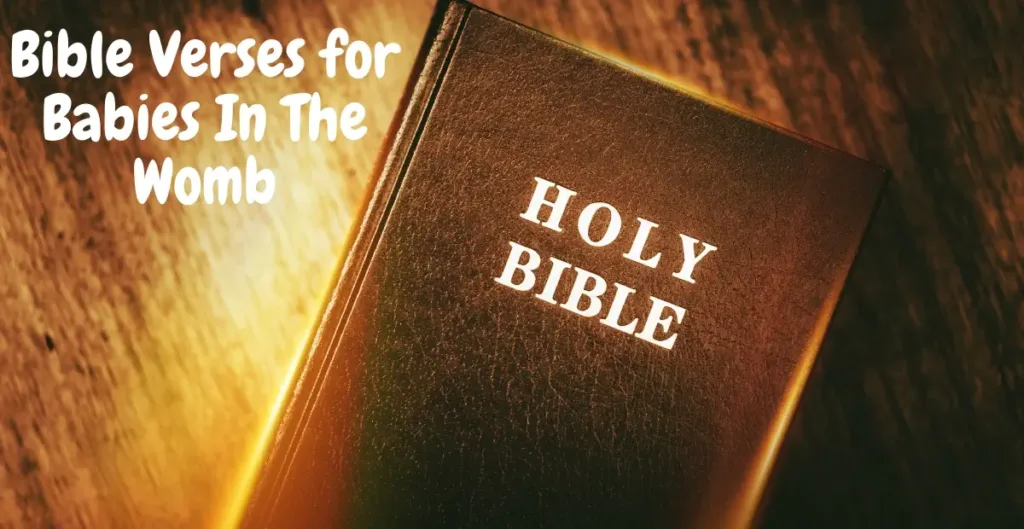Pregnancy is a miraculous yet vulnerable time. As an expecting mother carefully nurtures her growing baby, it’s natural to feel protective yet uncertain worries. What if something were to happen to my unborn child? Is the tiny life within me truly a human being? For Christian parents especially, such questions often lead to seeking wisdom from the ultimate source – God’s word.
This comprehensive guide explores over 45 Bible verses relating to unborn babies. By examining what Scripture reveals about life in the womb, we gain reassurance of our preborn children’s sacredness in the eyes of their Creator. Far from being ambiguous, the consistent message is one of awe for the intricate personhood God forms and profoundly cares for from the earliest stages.
Exodus 21:22-25 – Unborn Babies Have Legal Rights
A vital passage is found in Exodus 21, which establishes the Torah’s legal code. Verses 22-25 deal with assault on a pregnant woman:
“When men strive together and hit a pregnant woman so that her children come out, but there is no harm, the one who hit her shall surely be fined… But if there is harm, then you shall pay life for life.”
Notably, the Hebrew term for “children” here is commonly used throughout Scripture to denote born “sons.” This indicates the Torah viewed the unborn as full-fledged persons under the law’s protection. Their lives were to be avenged just as any individual’s, reflecting God’s inherent valuation of prenatal life.
Jeremiah 1:4-5 – God’s Election From the Womb
Another compelling verse is Jeremiah 1:4-5, where God calls the prophet:
“Before I formed you in the womb I knew you, and before you were born I consecrated you; I appointed you a prophet to the nations.”
This reveals God consciously selected Jeremiah for his role long before his earthly conception. Biblical scholars agree the Hebrew verb translated “formed” refers to a process of individual bodily formation, suggesting God views the preborn as distinct persons He knows and intends purposes for from their earliest stages of development.
Luke 1:41,44 – responsive preborn John the Baptist
When expecting John the Baptist, Elizabeth encounters her cousin Mary. At the sound of Mary’s greeting, “the baby leaped in her womb.” (Luke 1:41). Later, as “the baby in my womb leaped for joy,” Elizabeth recognizes the child’s response to Christ’s presence. (Luke 1:44).
This unique human behavior of an unborn baby reflected his God-ordained role as forerunner to Jesus. It also hints at the mysterious possibility of prenatal sentience and personality Christians find compatible with our faith.
Job 10:8-12 – God’s Artistic Handiwork in the Womb
The book of Job movingly explores God’s creative power, as in chapter 10:
“Your hands shaped me and made me…Did not one fashion us in the womb?… You clothed me with skin and flesh and knit me together with bones and sinews.”
Rather than a dispassionate process, Job views God tenderly crafting babies with expert care. He credits the Lord with personally wrapping him in flesh within his mother. For Job, the womb served as the starting point of God establishing each person as “the work of your hand.”
Genesis 2:7 – Human Origins from the Dust
The Genesis account likewise captures God deliberately bestowing life and spirit. Genesis 2:7 recounts how “the Lord God formed the man of dust from the ground and breathed into his nostrils the breath of life, and the man became a living creature.”
Though more ambiguous than later passages, Genesis sets a pattern of God deliberately forming each person. He crafts us through a process beginning with microscopic prenatal stages, all equally deserving of protection as sacred gifts originating from our Designer.
Isaiah 49:1,5 – Called From the Womb
The prophet Isaiah echoes God’s election “from the womb” of individuals like Jeremiah. Of himself, Isaiah says the Lord “formed me from the womb to be his servant.” God did not merely know him cognitively before birth but inwardly purposed his life’s trajectory from its earliest biological phases.
More Bible Verses Confirming Unborn Personhood
Space prohibits examining each related verse, but others like Psalm 22:9-10; Psalm 51:5; Psalm 139:13-16; Ecclesiastes 11:5; and Galatians 1:15 also testify to God’s providential involvement and viewing the preborn as distinct “persons.” When taken together, a consistent doctrinal picture emerges of the unborn warranting protection under biblical principles of justice and compassion from their very beginning.
Christian Scholar Insights
Leading theologians also defend the Bible’s pro-life view. Wayne Grudem writes, “The existence of a separate individual human life began at conception. From that time onward, an unborn child is a living human being.”
John Piper says “From the moment of conception a baby has the genetic composition and personal uniqueness of a distinct individual human being. Therefore to terminate a pregnancy is to terminate an actual human person.”
Theologian Paul Tripp advocates that Scripture reveals, “From the moment of fertilization, the humanity of the unborn is unmistakable.”
Biblically and scientifically, human life truly commences at fertilization, with only developmental changes occurring afterward as the little person grows under their mother’s care. As Francis Schaeffer put it in prescient form decades ago, “The child en ventre sa mere [in its mother’s womb] is a fully human being at every stage from conception to birth.”
A Culture Recapturing Biblical Wisdom
We pray our culture may regain biblical wisdom about the preborn through open discussion of what God discloses. As individuals turn from devaluing life in the womb to revering each stage of development as the start of a purposeful human story, reconciliation, and healing can spread.
May God grant us empathy for the vulnerability of the unborn and their mothers. May He instill in leaders compassion for the least of these through the lens of His word. May the defenseless find champions among believers resolved to precisely apply God’s standard of justice for all, born and preborn alike.
Through faith in God’s steadfast love and reliance on His word as our guide, together may we grow in empathy, wisdom, and advocacy for all in need of protection, born or unborn.
In Conclusion
This in-depth exploration of what the Bible says about unborn babies aimed to provide a thorough yet approachable compilation of relevant Scriptures and expert analyses. By allowing God’s perspective to inform our own on this sensitive issue, believers may find reassurance, direction, and inspiration to uphold life at its foundational stages.
Non-believers too may appreciate gaining insight into what motivates pro-life Christians. Overall it is my hope and prayer this study brings understanding that leads to healing discussions and positive cultural change regarding prenatal personhood. With God’s help, may righteousness and compassion increasingly prevail as we walk in His ways.






